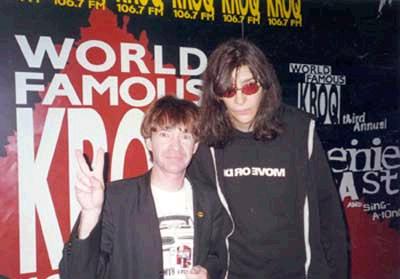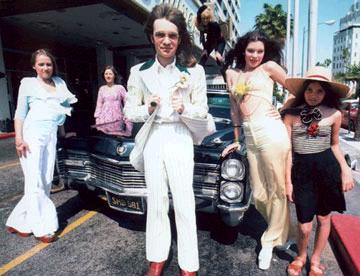

Celebrity is a fleeting thing, and in the world of music, even more so, where fads rapidly change to adjust to the fickle tastes of the public. People rise to stardom then fall just as rapidly, which makes Rodney Bingenheimer's longevity all the more impressive. Then, after watching Mayor of the Sunset Strip and realizing what kind of person Bingenheimer is, it is all the more amazing. He is an icon in the music industry, having befriended/discovered such acts as The Clash, The Ramones, Nirvana, David Bowie, The Sex Pistols, and numerous others. A veritable cavalcade of celebrities make their way across the screen to fawn over how Rodney helped them along the way, from musicians who got their start a while ago like Cher, Nancy Sinatra and Brian Wilson to newer acts like Gwen Stefani of No Doubt, Chris Martin of Coldplay.
Bingenheimer loves music and celebrity. As he tells director George Hickenlooper (The Man From Elysian Fields, The Big Brass Ring), his mother essentially abandoned him in Hollywood when he was a teenager. From there, he became something of a groupie, hanging out with all sorts of bands. They were drawn to him because he seemed like this gentle, unassuming guy who sincerely idolized them. He worked his way up to the top of the Hollywood social scene, appearing as a double for Davy Jones in The Monkees and showing up in all sorts of concert footage. He later opened a club that broke many bands from England. Bingenheimer is a fascinating person because someone with his personality seems so unlikely to have accomplished all this.
Hickenlooper realizes this and tries to dig into Bingenheimer by talking to the people around him. He is shy and withdrawn, but comes to life when talking about celebrities. And he seems to have no ulterior motive. He clearly hasn't profited from all of his discoveries. Others seem to glom onto him to try to take advantage of his celebrity status. And the attempts to analyze Bingenheimer's past by talking to old friends and his father and stepmother (all of whom seem equally dumbfounded that this guy knows so many names) come off as amateurish. After Hickenlooper is done, it's still not clear why Rodney is who he is, but Mayor of the Sunset Strip is a fun, quick, superficial trip through the last forty years or so of pop music. It seems that Rodney was there for pretty much every big event. For all the bands and artists not captured on archival video, there seems to be a photograph of him/her and Rodney. At times, it feels like Hickenlooper is doing one big fluff piece, a major piece of self-promotion for Bingenheimer. Eventually, after getting to know Rodney more, it's clear that this isn't the case. These musicians, in a rare case of altruistic role-reversal, are actually trying to get the word out about him.
Like many other documentarians, Hickenlooper is a little sparse in identifying some of his interviewees. He identifies the main people, but there are a number of quick shots of bands and artists he doesn't identify. Sure people can recognize Neil Young and Tori Amos, but do that many people know who Exene Cervenka and John Doe, or Jello Biafra are? There is a wealth of musical history here, and Rodney had a front-row seat to most of it. He still retains a level of celebrity because people will come to him, hoping for him to break them, but the fact remains that he is now something of an anachronism. He's currently relegated to a Sunday morning, 12-3am shift at influential Los Angeles station KROQ, where basically nobody can hear him. He still plugs along like he always has, but his profile is a lot lower. According to one of his fellow DJs, KROQ is "afraid" to fire him because it would be like losing its own soul. Indeed.